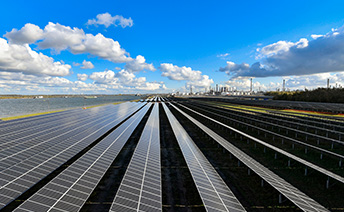European Chemical Industry Council (Cefic)
Cefic represents large, medium and small chemical companies in Europe, which account for around 15% of world chemical production.[1] It works on behalf of its members with EU institutions, non-governmental organisations, the media and other stakeholders; it is also a member of the International Council of Chemical Associations which engages on international chemicals issues.[2] It has a focus on issues such as sustainability, climate change, health and safety, the environment, product stewardship and industrial policy.[3]
Membership of board/executive committee: Shell is a member of the Cefic board of directors and the executive committee.
- 2022 assessment outcome: Aligned
- 2021 assessment outcome: Aligned
Summary
Shell benefits from its membership of Cefic, in particular through the association’s advocacy related to issues that impact the chemical sector. These include regulations related to emissions (air, water and waste) and to chemical health and safety, energy and climate.
We have found Cefic to be aligned with our climate and energy transition-related policy positions.
We will remain a member of Cefic. We will continue to engage the association on climate and energy transition topics. We will continue to track alignment between Cefic’s climate and energy transition-related positions and our own.
Further information
Click on the sections below to read more.
Paris Agreement and net-zero emissions
- Cefic has stated that it supports the temperature goals of the Paris Agreement.[4] [5]
- Cefic states that it supports the EU Green Deal and Europe’s ambition to be climate neutral by 2050.[6] [7] [8]
- Cefic states that the European chemical industry has the ambition to become climate neutral by 2050.[9]
Carbon pricing
- Cefic supports carbon pricing; it has stated support for emissions trading as a policy tool to achieve emission reductions.[10]
- In its 2022 position paper on the Carbon Border Adjustment Mechanism (CBAM), Cefic states support for effective carbon leakage protection; Cefic states that “the CBAM proposal, if applied to the EU chemical sector, would require resolving four key issues: indirect carbon costs, covering full value chains, export competitiveness and feasible and effective functioning.”[11]
Energy efficiency
- Cefic states that the European chemical industry needs to improve energy efficiency to further reduce its greenhouse gas emissions.[12]
- In an October 2021 position paper on the Energy Efficiency Directive, Cefic stated support for the revised Energy Efficiency Directive, the “energy efficiency first principle”, and welcomed “the European Commission’s recognition of the significant un-tapped potential for energy savings in new and existing buildings”.[13]
Decarbonised hydrogen
- Cefic has stated: “We agree with the European Commission that accelerated deployment of a clean hydrogen economy will be essential to make the energy transition succeed. Europe needs a Hydrogen Strategy that will scale-up the production and use of climate-friendly hydrogen, helping the chemical industry to significantly reduce its GHG footprint”.[14]
- In a 2022 position paper on the Gas Directive and Gas Regulation, Cefic states it supports the European Commission’s proposal to amend the Gas Directive and Gas Regulation and “welcomes the Commission ambition to develop both a competitive hydrogen market and a renewable and low-carbon gas market in the EU.”[15]
Natural ecosystems
- In its 2022 position paper on Restoring carbon cycles, Cefic stated: “The use of natural sinks as a means of balancing hard-to-abate emissions is a valid, long-term perspective and will be necessary to achieve climate neutrality by 2050, as supported by the EU’s and IPCC’s scenarios work.”[16]
Carbon capture and storage
- Cefic has stated that carbon capture and storage “can contribute to meeting Paris Agreement GHG emission ambition”.[17]
- In a 2022 statement, Cefic stated: “Technologies such as Carbon Capture and Utilisation (CCU), which capture CO2 straight from industrial processes, are vital for our industry to reduce emissions and will reduce the need for carbon removals in the future.”[18]
- In a 2022 position paper on sustainable carbon cycles, Cefic states that the EU’s strategy should consider the role of chemical products as a carbon storage option and that recycling of carbon stored in materials of (end of use) products should be included in the circular economy-related legislative framework.[19]
Environmental, social and governance (ESG) standards and benchmarks, sustainable finance taxonomies
- Cefic has stated that it “welcomes EU efforts in mainstreaming sustainable finance and positioning it as a precursor to achieving European and global climate ambitions”.[20]
- In its 2021 position paper about the Corporate Sustainability Reporting Directive (CSRD), Cefic stated that it “welcomes further development of the EU Sustainable Finance Agenda” and that “reliable, comparable and relevant information on companies’ exposure to sustainability risks will enable informed decision-making that fosters investment in economic activities contributing to the socially just and sustainable economic transition”.[21] It also stated a number of recommendations for the CSRD, including “coherence with established and upcoming reporting requirements.”[22]
- In its 2021 position paper on EU taxonomy and transition financing, Cefic stated that “the development of a common language (EU Taxonomy) could enable informed decision-making to foster investment in environmentally sustainable activities and technologies.”[23]
Coal
No position
Electrification with renewable or low-carbon power
- Cefic states that switching to renewable power and hydrogen is one of the key solutions for the chemical industry to reduce emissions.[24] [25]
- In 2022, Cefic stated support for the REPowerEU action plan’s aim to increase renewable energy generation in the EU while also building international energy partnerships.[26] [27] [28]
Gases and methane
- In a 2022 position paper on the EU Commission proposal amending the Gas Directive and Gas Regulation, Cefic “welcomes the Commission ambition to develop both a competitive hydrogen market and a renewable and low-carbon gas market in the EU”.[29]
- In a 2021 paper on methane emissions in the chemicals industry, Cefic stated that reducing methane emissions is “essential to reaching EU’s climate targets as well as contributing to the EU’s zero-pollution ambition”. It also states: “Methane emissions from refineries and chemical plants represent only a small fraction of the methane emissions reported by other EU industrial facilities covered by E-PRTR [the European Pollutant Release and Transfer Register] and are very small compared to the CO2 emissions from refineries and chemical plants.”[30] Cefic has not stated a position on ending routine flaring.
Road transport: Passenger cars and vans
No position
Road transport: Heavy-duty vehicles
No position
Heavy industry decarbonisation
- Cefic states that the European chemical industry has the ambition of becoming climate neutral by 2050.[31]
- Cefic states that the EU chemical industry is expected to be an industrial champion in the use of clean hydrogen and that the REPowerEU Plan and the Hydrogen Accelerator are crucial instruments to develop the clean hydrogen market.[32]
- Cefic was signatory to a 2022 joint industry letter that stated: “Our industries support RePowerEU as it will help providing the energy carriers and infrastructures the EU needs for achieving its climate objectives and energy resilience. However, even more urgently than ever before the EU must also secure investment in the technologies to decarbonise energy intensive sectors in order to stop the EU’s de-industrialisation.”[33]
Aviation
No position
Shipping
No position
Return to list of associations[1] https://cefic.org/about-us/
[2] https://cefic.org/about-us/
[3] https://cefic.org/about-us/organization/
[4] https://cefic.org/a-solution-provider-for-sustainability/cefic-sustainable-development-indicators/create-low-carbon-economy/
[5] https://cefic.org/policy-matters/chemical-industry-green-deal/how-can-europes-chemical-industry-help-deliver-on-the-green-deal/
[6] https://cefic.org/policy-matters/chemical-industry-green-deal/how-can-europes-chemical-industry-help-deliver-on-the-green-deal/
[7] https://cefic.org/policy-matters/climate-change-and-energy/towards-implementing-the-climate-law/
[8] https://twitter.com/Cefic/status/1520062557658222595
[9] https://cefic.org/policy-matters/welcoming-fit-for-55/
[10] https://cefic.org/app/uploads/2021/11/Cefic-Position-ETS-review-Final.pdf
[11] https://cefic.org/app/uploads/2022/01/Cefic-position-on-CBAM-The-Carbon-Border-Adjustment-Mechanism-CBAM-proposal-needs-upgrading-for-chemicals.pdf
[12] https://cefic.org/a-solution-provider-for-sustainability/cefic-sustainable-development-indicators/create-low-carbon-economy/
[13] https://cefic.org/app/uploads/2021/11/Cefic_Position_Paper_EED.pdf
[14] https://cefic.org/policy-matters/climate-change-and-energy/hydrogen/
[15] https://cefic.org/app/uploads/2022/04/Cefic-Position-Hydrogen-Decarbonised-Gas-Market-Package.pdf
[16] https://cefic.org/app/uploads/2022/05/Cefic-position-on-Restoring-sustainable-carbon-cycles.pdf
[17] https://cefic.org/app/uploads/2022/11/Cefic_contribution_Carbon-Capture-and-Storage-can-contribute-to-meeting-Paris-Agreement-GHG-emission-ambition.pdf
[18] https://cefic.org/media-corner/newsroom/on-the-road-to-net-zero-next-to-avoiding-emissions-the-industry-will-need-to-invest-into-carbon-removal/
[19] https://cefic.org/app/uploads/2022/05/Cefic-position-on-Restoring-sustainable-carbon-cycles.pdf
[20] https://cefic.org/policy-matters/industrial-policy/sustainable-finance/
[21] https://cefic.org/policy-matters/industrial-policy/sustainable-finance/
[22] https://cefic.org/app/uploads/2022/08/Cefic-CSRD-Consultation-Response-Submitted-Version.pdf
[23] https://cefic.org/app/uploads/2021/03/Cefic-Views-on-EU-Taxonomy-Transition-Finance.pdf
[24] https://cefic.org/media-corner/newsroom/how-can-the-chemical-industry-help-europe-transition-to-climate-neutrality/
[25] https://cefic.org/media-corner/newsroom/the-road-to-2050-what-measures-are-necessary-to-accelerate-energy-transition/
[26] https://cefic.org/media-corner/newsroom/cefic-statement-on-the-publication-of-the-repowereu-action-plan/
[27] https://www.linkedin.com/posts/cefic-european-chemical-industry-council_eu-cleanenergy-repower-activity-6933057439617433600-JrI6/?utm_source=share&utm_medium=member_desktop
[28] https://twitter.com/Cefic/status/1527270859987091458
[29] https://cefic.org/app/uploads/2022/04/Cefic-Position-Hydrogen-Decarbonised-Gas-Market-Package.pdf
[30] https://cefic.org/app/uploads/2021/03/Methane-emissions-in-the-chemical-industry-March-2021.pdf
[31] https://cefic.org/policy-matters/chemical-industry-green-deal/how-can-europes-chemical-industry-help-deliver-on-the-green-deal/
[32] https://cefic.org/media-corner/newsroom/cefic-statement-on-the-publication-of-the-repowereu-action-plan/
[33] https://www.fuelseurope.eu/uploads/files/modules/publications/1670861040_20221208%20Energy%20Intensive%20Industries_ETS_RepowerEU_Innovation%20Fund.pdf










